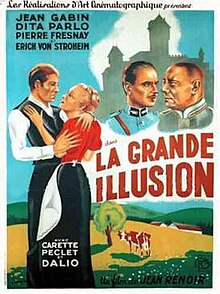Grand Illusion (film)
| La Grande Illusion | |
|---|---|

French film poster
|
|
| Directed by | Jean Renoir |
| Produced by |
Uncredited: Albert Pinkovitch Frank Rollmer |
| Written by | Jean Renoir Charles Spaak |
| Starring |
Jean Gabin Dita Parlo Pierre Fresnay Erich von Stroheim |
| Music by | Joseph Kosma |
| Cinematography | Christian Matras |
| Edited by | Marthe Huguet Marguerite Renoir |
|
Production
company |
Réalisations d'Art Cinématographique (RAC)
|
| Distributed by | World Pictures (original U.S. release) Janus Films (later release) |
|
Release date
|
|
|
Running time
|
114 minutes |
| Country | France |
| Language | French German English |
| Box office | $174,065 (US re-release) |
La Grande Illusion (also known as Grand Illusion) is a 1937 French war film directed by Jean Renoir, who co-wrote the screenplay with Charles Spaak. The story concerns class relationships among a small group of French officers who are prisoners of war during World War I and are plotting an escape. The title of the film comes from the book The Great Illusion by British economist Norman Angell, which argued that war is futile because of the common economic interests of all European nations. The perspective of the film is generously humanistic to its characters of various nationalities. It is regarded by critics and film historians as one of the masterpieces of French cinema and among the greatest films ever made. Orson Welles named La Grande Illusion as one of the two movies he would take with him "on the ark."Empire magazine ranked it #35 in "The 100 Best Films Of World Cinema" in 2010.
During the First World War, two French aviators, the aristocratic Captain de Boeldieu (Pierre Fresnay) and the working-class Lieutenant Maréchal (Jean Gabin), set out on a flight to examine the site of a blurred spot found on photographs from an earlier air reconnaissance mission. They are shot down by a German aviator and aristocrat, Rittmeister von Rauffenstein (Erich von Stroheim), and both are taken prisoner by German ground forces. Upon returning to base, Rauffenstein sends a subordinate to find out if the aviators are officers and, if so, to invite them to lunch. During the meal, Rauffenstein and Boeldieu discover they have mutual acquaintances—a depiction of the familiarity, if not solidarity, within the upper classes that crosses national boundaries.
...
Wikipedia
